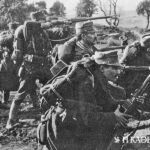After the death of Joseph Stalin in March 1953, Nikita Khrushchev emerged as a leading figure in the Soviet Union. The first secretary of the Central Committee of the Communist Party of the Soviet Union Khrushchev prevailed in the power struggle (1953-1955) against Prime Minister Georgy Malenkov and in 1958 he established himself in power by also occupying the position of Prime Minister. At the 20th Congress of the Communist Party of the Soviet Union the often crude in his manners, the son of a peasant Khrushchev repudiated Stalin’s policies by proclaiming the de-Stalinization of the state. It was a significant change, which was related to the new leadership’s attempt to wean itself off the personality of the politician who managed to make the Soviet Union a great power, often using extreme repressive methods.
The new Soviet leadership seemed almost from the beginning to be willing to pursue a more moderate policy in relation to Stalin, a fact that became obvious to all with the agreement for an armistice in Korea in July 1953. The goal was now a policy of peaceful coexistence, based on whose capitalist and communist states remained rivals, but would compete by peaceful means.
The policy of the new Soviet leadership highlighted the Soviet Union’s peacetime achievements, such as the rapid development of heavy industry, as well as the regime’s confidence that it had the potential to catch up and even surpass the West in economic development. For its part, the West saw the turn of Soviet policy in a positive way. Although they had always been suspicious of the Soviets’ intentions, the West was relieved by this development, as the rivalry between the two coalitions had peaked in previous years.
The calm atmosphere between the two warring Cold War coalitions did not last long. The launch of Sputnik 1 on October 4, 1957 demonstrated that the Soviet Union now possessed the technology to build intercontinental ballistic missiles capable of striking American soil with nuclear weapons, causing skepticism among European leaders about the United States’ ability to protect the old continent from the Soviet threat.
“The announcement from Moscow about the launch into space of the first artificial satellite of the Earth was the main news on all the news reports of the American radio and television stations last night”, wrote “Kathimerini” on the front page of the 6her October 1957 commenting on the launch of “Sputnik 1” two days earlier. Continuing, the newspaper reported that “an NBC radio network commentator said the news meant the Russians had won their first friendly since the United States on the occasion of the International Geophysical Year.”
According to the “Kathimerini” report, “the satellite is only visible at dawn and dusk. The receivers of the radio company “NBC” received the Soviet satellite today at about 01.15 GMT today. In Charleston, Virginia, a 12-year-old boy scout declared last night that at around 8:50 p.m. local time last night, he spotted the Soviet satellite in the sky.
The Sputnik 1 satellite caused more concern in the West about Soviet technological progress than was actually the case. Even Khrushchev himself was aware of the backwardness of his country, which needed much more investment to reach the levels of technological advancement of the West.
Column Editor: Myrto Katsigera, Vassilis Minakakis, Antigone-Despina Poimenidou, Athanasios Syroplakis





